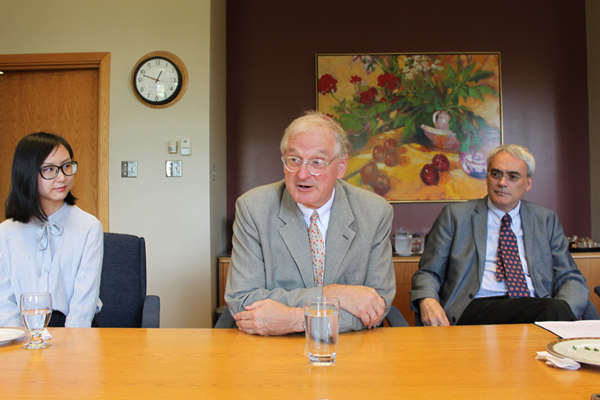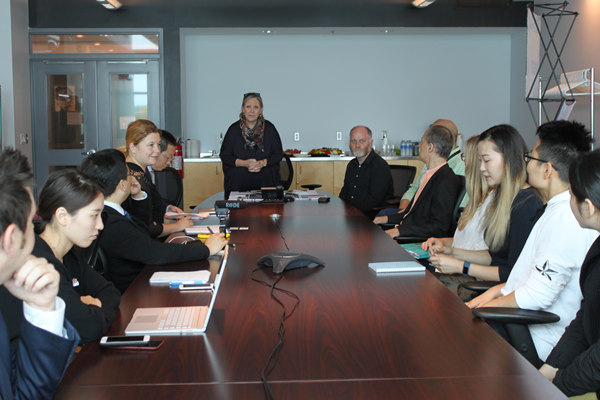


Canada's universities eager for Chinese partnerships
As an education destination that continues to welcome a large number of students from across the world, especially from China, Canada and its universities are forging more partnerships with their Chinese counterparts.
Chinese students' interest in a Canadian education is so strong that more Canadian universities and colleges are going on more education missions to China.
That collaboration will be on display in a mission on Oct 19 at the China-Canada Education Cooperation Forum, which will involve many Canadian university presidents promoting Canadian higher education.
"The demand for participation in missions to China is really huge. Right now, we are excited that more than 40 of Canada's universities are taking part; 50 percent of our universities are going on these larger missions," said Helen Murphy, director of communication, Universities Canada, one of the stakeholders in the Canadian Consortium for International Education.
"There will be some level of understanding and new partnerships, and we are trying to raise awareness with Canadian media about why we find partnerships are so important. This is the evolution of Canadian universities on the research side, and we are going to build capacities to operate as equal partners," Murphy said.
Another initiative is to support and increase student mobility in Canada back to China, with many Canadian companies in the private sector going after graduates who could speak Mandarin and have Canadian experience. That is so they could potentially help in operations and trading relationships, according to Andreas Weichert, executive director at International Education Global Affairs Canada.
"We are also sending a message domestically to our politicians about supporting foreign research collaboration now that a survey result showed 95 percent of Canadians support international research, and that we ought to do more in this regard," he said.

Jacques Fremont (centre), president of the University of Ottawa, recognizes the benefits of cooperation and collaboration between his university and Chinese universities.
Jacques Fremont, president of the University of Ottawa, recognized the benefits of cooperation and collaboration of his university with several Chinese universities, for example, Shanghai Jiao Tong University.
"There is an intense relationship, especially in medical studies, engineering and education. We always have dozens of Chinese people coming under specific programs. Our agreements and collaboration with Chinese universities really make a difference. It is very important," Fremont said.
A couple of months ago, the university signed an agreement with the Chinese Academy of Sciences in Shanghai in systems biology, which he said will send both schools to the top tier in research worldwide.
"China is a very good and major player, and we are closer to China. A strategic partnership with China is certainly one of the most important relationships we have," Fremont added.
Canada is known for its world-class educational institutions, ranking seventh in international education, and for its friendly, relatively safe environment, said Gary W. Slater, associate vice-president of the University of Ottawa.
"The Canadian education system is of very high quality overall. We have many quality-control programs, and people know, and they come to Canada for the high-quality education we offer," Slater said, adding that the university does not normally talk about majors but emphasizes standards.
Slater said the university's physics and chemistry programs are highly ranked, and it also is known for its public administration, international relations and law programs in two languages. He said being located in Canada’s capital also is a benefit.
McGill University is another prestigious university that has a long tradition of partnering with China. Its researchers are actively working in partnerships with China in areas such as engineering, architecture, neuroscience, genomics and biomedical sciences.
"For example, in terms of research, we have a good relationship with Huawei, the big player in telecommunication technology in 5G. We're developing a chair with Huawei now," said Benoit Boilet, associate dean on McGill's Faculty of Engineering. "Huwei has established a lab in Montreal; there're a lot of interactions between us happening."
Phil Ohorn, associate provost for international affairs at McGill University, asserted that China is one of the major research partners, as it is now the largest source of foreign students in Canada.
"We are a much internationalized university, and we are very proud that we have a student audience from all over the world, China in particular," he said.

Dianne Taylor-Gearing (standing), president of NSCAD University, one of Canada's oldest independent cultural institutions, located in Halifax, Nova Scotia, discusses the university's strength of education and research in visual culture to Chinese international students on campus.
Chinese are the second largest international student group in Quebec after France. There were 4,568 Chinese students as of last fall at the province's institutions of higher learning institutions, a 61.3 percent increase.
Among English-speaking countries, Canada stands out, offering higher education also in French to international students numbering close to 450,000, according to the 2016 edition of A World of Learning: Canada's Performance and Potential in International Education.
"You can learn both English and French, it would be very interesting for international students," said Alec Jean-Blouin, international affairs adviser at Education Quebec.
Another institution that strongly engages China is HEC Montreal, a university business school with a reputation for teaching and research that has helped deliver business talent in English and French to Africa, for Chinese companies that need bilingual workers.
Agnes Darmaillacq, the administrator director of International Activities and Student Mobility at HEC Montreal, said it had become a trend for many Chinese companies to go to Quebec for training while they look for French-language skills in management and other areas.
"We have a long relationship with Chinese companies in the energy sector. We train managers and executives from these companies which invested in Africa. HEC Montreal has advantages in delivering business talent in English and French to Africa for Chinese companies," she said.
HEC Montreal has two decades of collaboration with China Three Gorges Corp, China Yangtze Power Corp and Jilin Electric Power, as well as with companies on energy management education.
"We started with provincial and then national training for their managers. When their executives come here, they learn English and French. They appreciate our training and are interested in our students who can speak French, English and Chinese," she said.
Polytechnique Montreal has seen much collaboration with China in the field of aerospace and transportation area for almost 30 years, from signing an agreement with Harbin Institute of Technology in 1988 to another with Beihang University in 2015.
Robert Summerby-Murray, president of Saint Mary's University in Halifax, Nova Scotia, who was "fortunately" involved in the launch of Nova Scotia's China engagement strategy, said "it is very important" for the university to participate in the strategy, which outlines how the province will forge a stronger alliance with China by building mutually beneficial trade, investment, business, political, and cultural relationships.
"We engage the strategy by doing research on food production and focus on marketing, organization behavior and finance that are required to value-add to agricultural and marine products from Nova Scotia headed for the Chinese market," Murray said.

View of Canada's capital city Ottawa from the University of Ottawa. PHOTOS BY NA LI / CHINA DAILY
Canada and China boast a long history of collaboration in education that started shortly after the establishment of diplomatic relations in 1970, when Prime Minister Pierre Trudeau and Chinese Premier Zhou Enlai established the Canada China Scholars' Exchange Program (CCSEP) in 1973.
Since then, education has always been a pillar of the China-Canada relationship. Today, cooperation in education is extensive and recognized by both countries as a priority. There are hundreds of active agreements between Canadian and Chinese institutions. These agreements facilitate the exchange of students, faculty, staff and curricula, joint research and joint degree programs.
In September 2016, with the witness of Premier Li Keqiang and Canadian Prime Minister Justin Trudeau, the first ever memorandum of understanding on bilateral education cooperation was signed between the two governments, announcing that Canada will be the Country of Honour at the 2017 China Education Expo in Beijing.
Ohorn said Chinese students are lucky because they come into a welcoming and comprehensive society that is exposed to different ways of life and cultures from all over the world.
"We have graduate and undergraduate programs with specific universities and innovative online programs in China. Our environment allows us to work together and help one another, and this is one of our strengths: the ability to welcome people from all over the world," he said.

John A. See, director of partnership and development Asia, Laval University, said that in the last 10 years, strategies have been put in place to develop deeper relationships with China so that there would be more internationalization with Chinese universities.
"It is our priority to work with China and do lots of student recruitment. We started in Shanghai and Beijing, where the biggest universities are, forging long-term collaboration and strong relationships and focusing on internationalizing universities like the Beijing Institute of Technology and Shanghai Jiao Tong University," he said.
Laval sends delegations to PhD workshops in Beijing every year, and these missions also go to schools and universities to promote the university.
"So gradually, we have got a very strong relationship, but more importantly, with the funding from China, we can support those students. We also have an agreement to sponsor our students to go to China to do studies on subjects like archaeology, culture and language," See said.
Source: http://www.chinadaily.com.cn/world/2017-10/14/content_33225121.htm
renali@chinadailyusa.com